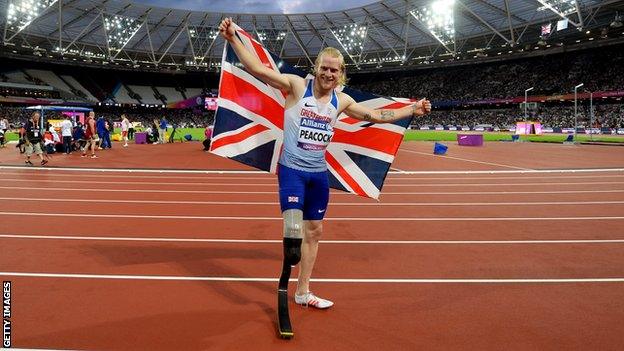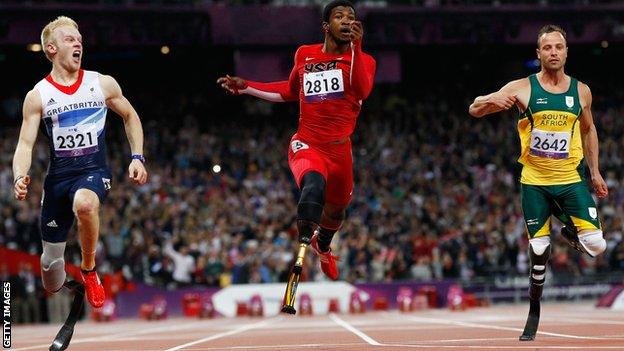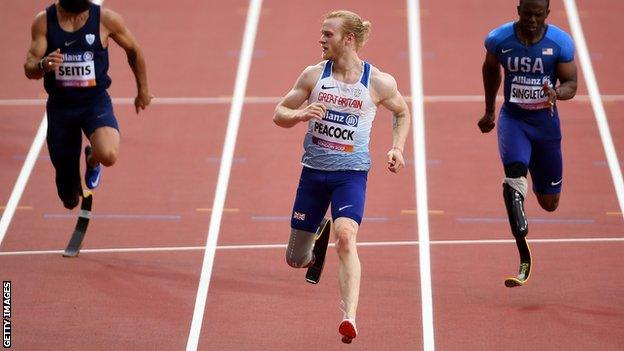World Para-athletics Championships: How Jonnie Peacock became main attraction
- Published

Peacock has won gold at the past two Paralympics, and the 2013 and 2017 World Para-athletics Championships
"He's like the postman - he always delivers."
So said Aled Davies as his British team-mate and friend Jonnie Peacock prepared for Sunday's T44 100m final at the World Para-athletics Championships.
Peacock, already a double Paralympic champion, not only delivered, but wrapped the package and stuck on a bow by claiming his second world title at London Stadium.
It was a performance that cemented the 24-year-old's status as Britain's blockbuster attraction in Para-athletics.
But how has a quiet boy from Cambridgeshire, who had his leg amputated below the knee as a five-year-old after contracting meningitis, found the ingredients to become a global sprint star?
Have the right attitude - and personality
Peacock's breakthrough moment came in the same stadium as Sunday's triumph, taking his first career global title at London 2012.
He had broken the world record two years earlier, but that was in very favourable conditions and he was viewed by most as an outsider for gold at the 2012 Paralympics.
A lot of that, perhaps, came from his understated and unassuming character.
"He is not the archetypal sprinter - cocky and brash. He's a very considered guy and quite quiet," said BBC Radio 5 live expert Allison Curbishley, a Commonwealth Games 400m silver medallist.
"The first time I met him in 2010, he was with his mum, and there was a lot of hype about this guy. He was a kid and so young but you could tell there was something - good looking guy, blond hair, blue eyes, really popular with all the ladies."
Before his victory at London 2012, Peacock stood on the start line and raised a finger to his mouth to silence the crowd. Tens of thousands of people obliged.
For 11-time Paralympic champion Baroness Grey-Thompson, it was a defining moment.
"Of all the years I've been watching any athletics, he's the only person I've seen shush an audience. That was incredible. That moment set him on a different level," she said.
"He's quite humble. He gets on with it. He's great at spending time with people and kids and there's a lot of athletes who don't like that."
Be there when blades are cool
Before Peacock's emergence, South African sprinter Oscar Pistorius had put amputee athletics on the map in the mid-2000s, winning the first four of his Paralympic titles and expressing a desire to compete in the Olympics.
With Pistorius in the sporting limelight, blades - the curved prosthetics used by amputee runners - became cool.
"Until blades were starting to come through in the 1990s, amputee running was quite awkward and it was clunky to watch," said Grey-Thompson. "It didn't look really elegant.
"As the blades changed you could run in the style of an able-bodied athlete. The times came down and it became more understandable for people to watch."
In 2012, Pistorius would finish fourth and almost two tenths of a second behind Peacock in the 100m.
"At that point, with Oscar Pistorius, blade running had started to become quite sexy," said Curbishley.
"Jonnie's had a lot more crossover with the able-bodied athletes, in terms of where they train and sharing coaches. He's benefited from it.
"He ran in the British trials for the IAAF World Championships the other week and you wouldn't have seen that in Tanni's day and not when I was an athlete."

Peacock (left) beat Richard Browne (centre) and Pistorius (right) at London 2012. Four years later, Pistorius was sentenced to six years in prison for the murder of his girlfriend Reeva Steenkamp in 2013
Be extremely talented
Peacock is unbeaten in major competitions, winning two Paralympic finals and two World Championships finals.
He has found a way of peaking for the crucial moments.
"He's always been able to deliver when it matters. World records are great but gold medals are what you want," said Grey-Thompson.
"The rivalries have changed. With Richard Browne and now Jarryd Wallace you have that American brashness with a bit of fighting talk. For spectators, it's quite fun to watch, especially if he wins."
Peacock won his heat in a personal best of 10.64 seconds on Sunday, just 0.03secs short of Browne's world record.
He has put on weight since Rio 2016 to improve his power, saying before the championships he was the heaviest he has been.
"His time is phenomenal for a single-leg athlete," said Curbishley.
"A double-leg amputee sprinter is balanced when they get running. It's an art in itself to sprint with the power and speed when you are on one prosthesis. It's impressive."
Cope with the pain of being an amputee athlete
Peacock has had to battle injuries, particularly in the past four years.
He was touch and go for the World Championships in Lyon in 2013, when he won gold, and missed the 2015 Worlds in Doha with a sore on his stump.
"For amputee sprinters, it's very difficult. If you have any bruising or the slightest mark on your stump you can't train," said Grey-Thompson.
"It changes everything you do. As an amputee, you have bone and soft tissue without the joints and bits protecting it. Long-term, that's tough on the body. That area of skin can be really hard to heal - you could be out for six months or a year."

Peacock won Sunday's final despite cramping beforehand: "I was stretching my hamstring over and over again and that is not a usual thing to do on the start line"
But does he go to Tokyo 2020?
Prior to the London World Championships, Peacock had not committed to racing at the Paralympic Games in Tokyo in 2020 for certain.
However, speaking to Channel 4 after Sunday's race, external, he said he would take 2018 off with the aim of then competing in Japan.
"So 2019 will be a comeback year for me," he said. "I'll try to make sure I can get myself back into one piece and definitely by Tokyo we'll be there."
If he makes it to Tokyo will it be his last appearance on the track? He will be 27 then, and likely feeling the strain of years of sprinting. There could also be opportunities outside of athletics.
"He speaks well, he looks great, he's a sponsor's dream and I'm sure a lot of other athletes in the team look at that," said Curbishley.
"I really hope he goes on to Tokyo because the event is so exciting and I'd love to see him there still doing the job."
Grey-Thompson said: "Tokyo seems a long way off. Everyone will want to see him there but he will have to be in better and better shape as he gets older.
"It's wise to think about life after sport but he won't have to worry about it because he'll have so many opportunities."
- Published16 July 2017

- Published13 July 2017

- Published3 March 2018
